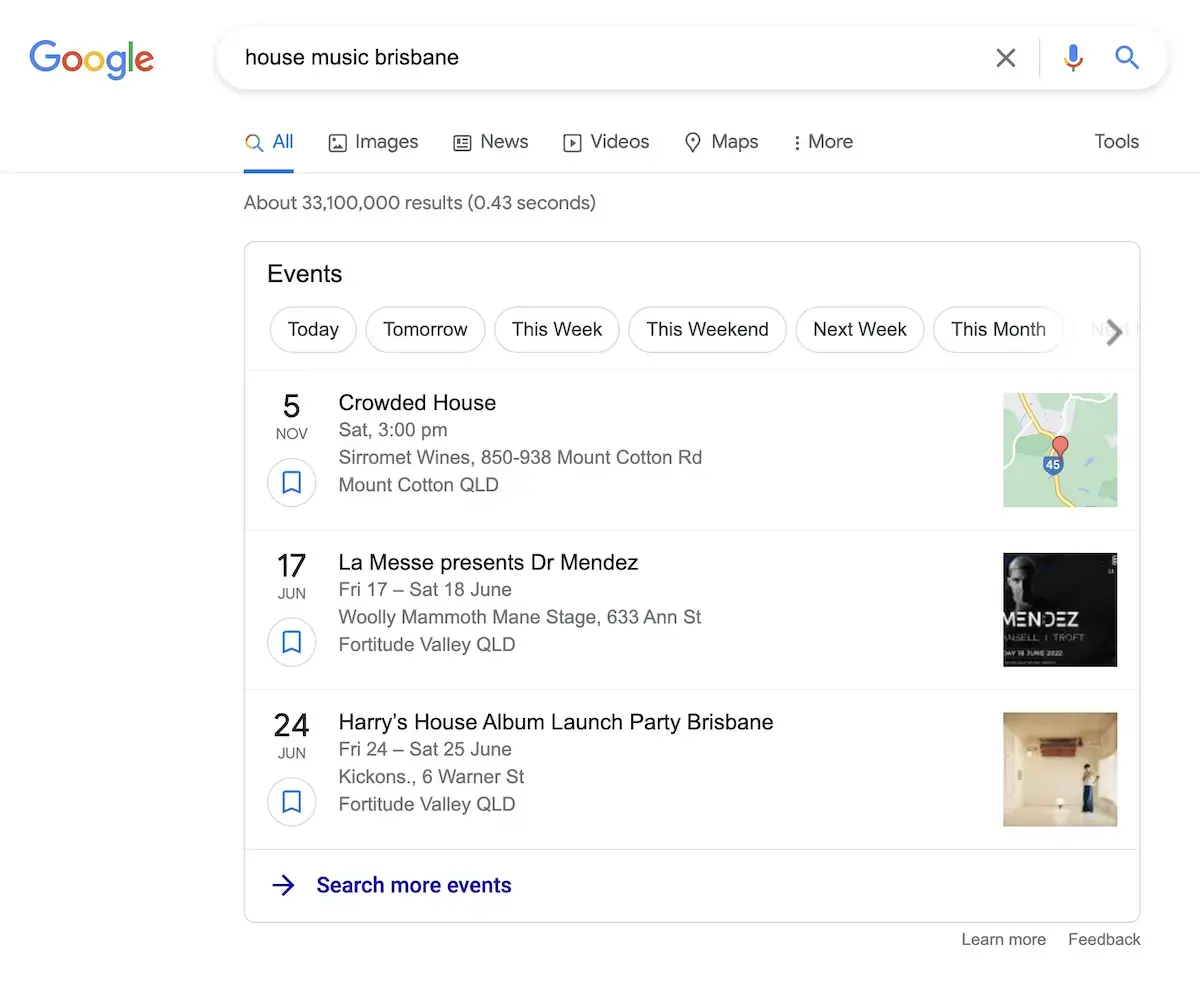On Page vs Off Page SEO: What They Are & Why You Need Both
SEO can be broken down into two main categories, both as important as each other: on page SEO, and off page SEO. But what’s the difference between the two? And what are the various techniques for each? In this article, we take an in-depth look at on page vs off page SEO, so you can execute both of them and achieve formidable rankings for your website.
What is on page SEO?
On page SEO is changes to your website that help to improve its ranking. This includes creating keyword-rich content, optimising meta tags, and writing cleaner code to speed up load times. On page SEO must take place on your website. If you’re completing SEO work outside of your website (like a link building campaign), that’s off page SEO.
The first goal of on page SEO is to make your website valuable and user friendly for people, which you can achieve by creating well-written content that meets their needs, and usable features that allows them to navigate and use your site with ease. When these crucial components are achieved, people will stay on your site longer, click on your CTAs, and visit more pages, which search engines see as positive user signals for your website, and may reward you with higher rankings. Then a positive feedback loop kicks in where you get even more visitors and better rankings, which generates extra leads and sales for your business.
The second goal of on page SEO is to make your website clear and accessible for search engines, so that they can figure out what each page is about, and when they are relevant for people’s search queries (this is also known as technical SEO). Important actions include creating keyword-rich content and meta tags, relevant internal links, and an up-to-date sitemap. The better optimised your pages, the easier search engines can understand them, and the more accurate the matching.
These are some of the most effective areas to focus on for on page SEO, to improve your website’s ranking:
1. Meta tags
Meta tags are snippets of code that describe a page’s content, and search engines use them to help categorise the page. The decisive meta tags are the title, meta description, and URL, and to optimise them, you’ll want to include your primary targeted keyword. If you can naturally squeeze in another keyword, that’s a good idea too.
The “robots” meta tag is also important because it tells search engines how they should crawl and index the content. The default is to index the page and pass link value onto other pages, but there may be some instances where you don’t want to do this, so it’s worth checking the tag to see whether an incorrect setting has been applied (sometimes people accidentally set it to “noindex,” which tells search engines to leave the page out of their listings entirely—yikes).
2. Amazing content is the #1 on page SEO tactic
Content is the most influential thing for achieving high rankings, which is why we wrote an entire article about it: SEO copywriting. In a nutshell, you’ll need to write for your audience, know which keywords they use to find your content, create a solid outline, and write content that is truly helpful to them. Excellent copywriters who take the time to research content are worth their weight in gold.
3. Links
When you link to another page on your website, the search engine’s crawler may follow the link, discover the page for the first time, and then index it. If the linked-to-page is related to the core page, it also gives search engines more information on what your website is about, allowing them to better classify you. That’s why topic clusters can work so well with blogs. Create ten pieces of content about a particular topic, link them all together, and Google may start to see you as an authority on the subject.
External links have SEO value too, especially when you link to high quality, related websites.
4. Images should be optimised for on page SEO
Images are an essential part of web pages. They make them nicer to look at, help people to understand the page’s context, and more. We wrote an article on how to optimise images for SEO, which includes using the right format, the correct dimensions, including keywords in the file name and ALT tags, and more.
5. Clean, efficient code
When your webpages load, every piece of functioning code is “read” by the web browser. If the code is unnecessarily bloated and written in a way that would make a senior developer hug his cat a little too hard, the page will be slow and penalised by Google. Load speed has become a key factor for ranking in the last few years, so it’s critical for your website to load as quickly as possible, and to pass Google’s Core Web Vitals with flying colours.
Unfortunately, using pre-made templates is a common practice for building new websites, which tend to have bulky codebases and are rarely updated with the latest best practices for SEO. This leads to poorly ranking websites that cost you money in the long run. It’s usually better to find a reputable web design company that builds websites from the ground up.
6. Schema
Schema tags let you pass on crucial information about content to Google, which they can choose to show as a rich snippet. For example, if you’re promoting events on your website, you can markup each event using Schema tags, which Google can then choose to include in its search results as below:

7. Sitemaps are still a good on page SEO practice
A sitemap is a list of every page on your website, and how they are structured. They help search engines to discover and index all of your pages, so are important to include. CMS’s like WordPress automatically create (and update) an XML sitemap for your site, which sits in the root folder of your website.
8. Usability
A usable website will have more return visitors, and more active visitors, which tells search engines that people are responding positively. The result is higher rankings.
Key areas to focus on for SEO-driven usability are:
- Excellent, intuitive navigation
- A mobile-friendly, responsive design
- Usable forms
- Good use of headings and sub-headings
- Chunked information
For more help, check out our article on the best UX tips and tricks.
What is off page SEO?
Off page SEO is actions that take place outside of your website, like building backlinks, creating adverts to drive traffic to your pages, and generating positive customer reviews.
Traffic combined with positive user signals is a key ranking factor for Google and other major search engines, and off page SEO encourages traffic from sources other than their listings. This includes visits from websites, social platforms, and business directories. The more traffic your website receives, the better your SEO score will be.
Off page SEO is also about building authority for your site by generating backlinks and positive customer reviews. When another website adds a link from their site to yours, there’s a risk that their users will actually click on the link and leave their site, to be forever lost. So the link is a strong vote of confidence for the quality of your website. Customer reviews work in the same way—they’re a thumbs up for your business that search engines pay attention to.
These are the critical off page SEO elements to focus on:
1. Backlinks are a highly effective off page SEO technique
When Google first launched in 1998, backlinks were the ranking factor for their algorithm. It’s evolved into something much more sophisticated today, but backlinks (or inbound links) remain an important component because people don’t tend to add them lightly. If a website has added a backlink to your site, they are saying “this site has something valuable you should look at,” which search engines translate to “these guys are good at what they do, and people may want to visit their page.”
If you’d like to learn about how to get high quality backlinks, check out our article on the importance of backlinks for SEO.
2. Local SEO works well for off page SEO
Local SEO is a collection of techniques that help locals to find your business. The key tasks are optimising your Google Business profile, targeting geo-specific keywords in your content (e.g. gelato Brisbane), and seeking positive customer reviews. There’s plenty more you can do though, which we explore in our article on local SEO.
Citations are also a form of local SEO that can work well. They are mentions of your business’s name, address, and phone number on websites like business directories, and can often be added yourself.
3. Social media
While it isn’t clear whether social signals are a ranking factor in search engines’ algorithms, what is clear is that having popular social media pages will increase your inbound links and citations, encourage positive reviews, and get more repeat visitors to your website—all quality SEO achievements that will help to push your website upwards.
Influencer marketing can also be a powerful tool for getting your brand out there and attracting tons more visitors.
4. Traffic adverts
Adverts are often used to sell something directly, but they can also be an effective way to drive traffic to your website and boost your SEO. You can create adverts to promote your content, competitions, boost brand awareness, inform people about events, and much more. All of them can help to bring more people to your site through both digital and physical adverts. If your we
5. PR can help with off page SEO
PR may seem like an antiquated marketing tool that has little to do with SEO, but as with adverts, it’s simply another way to generate buzz and traffic for your business, which can lead to more website visitors. PR statements, advertorials, and business events are just a few ways to do so.
6. Customer reviews
Customer reviews are one of the best ways to foster trust in your business. The vast majority of us check reviews before buying a product or service, and if they are wholly positive, we are happy to investigate further and spend some time browsing through the company’s website. These are excellent user signals that search engines take into account.
7. Video marketing
We live in an age of quick consumption, where many of us would prefer to watch a two-minute video than read a 5-minute article. That’s why video has exploded with popularity, and also why so many companies are investing in video marketing to cater for their audiences.
Quality videos are watched, commented on, shared, linked to, used in rich snippets, and more. They can be a solid component of an off page SEO strategy.
8. Podcasts
Podcasts are a relatively new form of media that have also become super popular of late. The biggest podcasts in the world have millions of listeners per episode, with tremendous SEO benefits for their creators. The hard part is finding a niche and building an audience. It’s a long-term SEO strategy, but with great potential.
9. Events
If you’re using your stellar knowledge to run a successful business, why not share it with people in your area? Knowledge-sharing events are popular in the tech world, but they can work for pretty much any type of business. They make people more aware of your brand, help to generate backlinks, shares of your content, and tons of other opportunities that can help to grow your ranking.
On page vs off page SEO
To recap: on page SEO is improvements to your website, and off page SEO is actions that take place outside of your website. Google and other search engines consider both of these factors when deciding on a page’s rank, which makes both of them equally important. There’s no “better” type of SEO because they complement each other
On page SEO is all about making your website accessible, usable, and useful, so if you’re starting from scratch, you’ll naturally complete this first. Once done, users should be able to get real value from your website, whether it’s information relating to your products or services, blogs that help them solve their problems, or functionality that allows them to do what they need. Search engines will also be able to crawl your website easily, and get an idea of what it is about.
You can then start to build authority for the website with off page SEO, attracting high quality backlinks and more visitors. This will be an ongoing campaign that you should dedicate a certain amount of time to each month. On page SEO is ongoing too, and will also need continued commitment to keep on achieving results. Sadly, SEO isn’t a set and forget project that can be forgotten about once completed, but an open-ended campaign that requires regular work to retain rankings. That’s why so many people hire companies to do it for them—they simply don’t have the time. A company worth its salt will know how to achieve a good balance between on page and off page SEO, to slowly win Google’s favour and drive your website up its rankings.
| On page SEO | Off page SEO | |
| Elements to consider | Meta tagsContent
Internal linking Images Clean, efficient code Sitemap Page speed Usability |
BacklinksLocal SEO
Adverts PR Social media Customer reviews Video marketing Podcasts Events Forums |
| Where the work is completed | On your website | Outside of your website (e.g. social media, other websites) |




